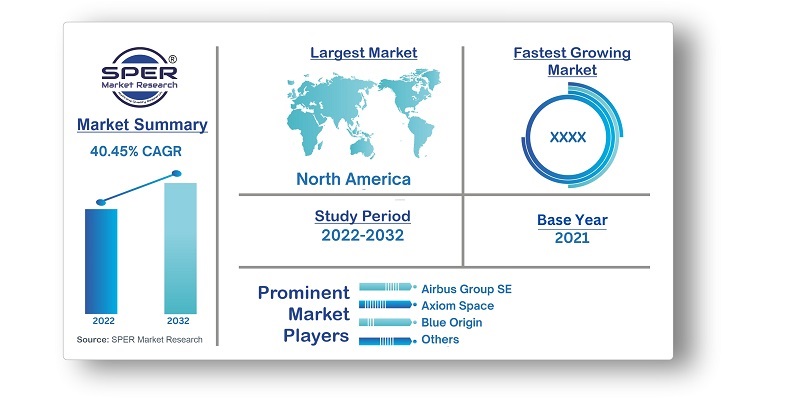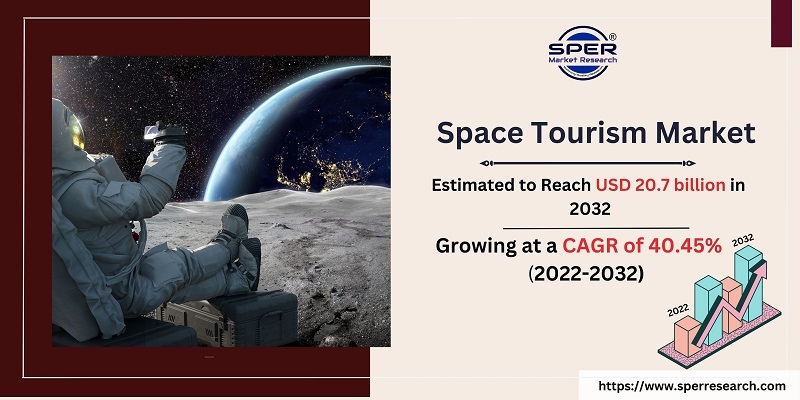
Space Tourism Market Growth, Size, Share, Scope, Challenges and Future Competition Till 2032
Global Space Tourism Market Size-By Tourism Type, By Tour Type, By End User, By Suppliers - Regional Outlook, Competitive Strategies and Segment Forecast to 2032
| Published: Mar-2023 | Report ID: TRAT2301 | Pages: 1 - 244 | Formats*: |
| Category : Travel & Tourism | |||


| Report Metric | Details |
| Market size available for years | 2019-2032 |
| Base year considered | 2021 |
| Forecast period | 2022-2032 |
| Segments covered | By Tourism Type, By Tour Type, By End User, By Suppliers |
| Regions covered | Asia-Pacific, Europe, Middle East and Africa, North America, Latin America |
| Companies Covered | Airbus Group SE, Axiom Space, Blue Origin, Bigelow Aerospace, Excalibur Almaz, Limited, Orion Span, Space Adventures, SpaceX, The Boeing Company, Virgin Galactic, World View Enterprise, Zero2Infinity, ZERO-G |
- Space Centres
- Space Tools Manufactures
- Space Tourism Firms
- Technology Consultants
- Other
- Orbital
- Suborbital
- Stratospheric
- Other
- Individual
- Professional
- Group
- Other
- Government
- Commercial
- Other
- Direct Suppliers
- Indirect Suppliers
- Asia-Pacific
- Europe
- Middle East & Africa
- North America
- Latin America
- Size of Global Space Tourism Market (FY’2019-FY’2032)
- Overview of Global Space Tourism Market
- Segmentation of Global Space Tourism Market By Tourism Type (Orbital, Suborbital, Stratospheric, Other)
- Segmentation of Global Space Tourism Market By Tour Type (Individual, Professional, Group, Other)
- Segmentation of Global Space Tourism Market By End User (Government, Commercial, Other)
- Segmentation of Global Space Tourism Market By Suppliers Direct Suppliers (Airlines, Government Bodies) Indirect Suppliers (Aggregators, Corporate Buyers, Online Travel Agency, Travel Management Companies)
- Statistical Snap of Global Plastic Processing Machinery Market
- Growth Analysis of Global Space Tourism Market
- Problems and Challenges in Global Space Tourism Market
- Competitive Landscape in the Global Space Tourism Market
- Impact of COVID-19 and Demonetization on Global Space Tourism Market
- Details on Recent Investment in Global Space Tourism Market
- Competitive Analysis of Global Space Tourism Market
- Major Players in the Global Space Tourism Market
- SWOT Analysis of Global Space Tourism Market
- Global Space Tourism Market Future Outlook and Projections (FY’2019-FY’2032)
- Recommendations from Analyst
1.1. Scope of the report1.2. Market segment analysis
2.1 Research data source
2.1.1 Secondary data2.1.2 Primary data2.1.3 SPER’s internal database2.1.4 Premium insight from KOL’s
2.2 Market size estimation
2.2.1 Top-down and Bottom-up approach
2.3 Data triangulation
4.1. Driver, Restraint, Opportunity and Challenges analysis
4.1.1 Drivers4.1.2 Restraints4.1.3 Opportunities4.1.4 Challenges
4.2. COVID-19 Impacts of the Global Space Tourism Market
5.1. SWOT analysis
5.1.1 Strengths5.1.2 Weaknesses5.1.3 Opportunities5.1.4 Threats
5.2. PESTEL analysis
5.2.1 Political landscape5.2.2 Economic landscape5.2.3 Social landscape5.2.4 Technological landscape5.2.5 Environmental landscape5.2.6 Legal landscape
5.3. PORTER’S five forces analysis
5.3.1 Bargaining power of suppliers5.3.2 Bargaining power of Buyers5.3.3 Threat of Substitute5.3.4 Threat of new entrant5.3.5 Competitive rivalry
5.4. Heat map analysis
6.1 Global Space Tourism Market Manufacturing Base Distribution, Sales Area, Product Type6.2 Mergers & Acquisitions, Partnerships, Product Launch, and Collaboration in Global Space Tourism Market
7.1 Orbital7.2 Suborbital7.3 Stratospheric7.4 Other
8.1 Individual8.2 Professional8.3 Group8.4 Other
9.1 Government9.2 Commercial9.3 Other
10.1 Direct Suppliers
10.1.1 Airlines10.1.2 Government Bodies
10.2 Indirect Suppliers
10.2.1 Aggregators10.2.2 Corporate Buyers10.2.3 Online Travel Agency10.2.4 Travel Management Companies
11.1 Global Space Tourism Market Size and Market Share by Region (2019-2025)11.2 Global Space Tourism Market Size and Market Share by Region (2026-2032)11.3 Asia-Pacific11.3.1 Australia
11.3.2 China11.3.3 India11.3.4 Japan11.3.5 South Korea11.3.6 Rest of Asia-Pacific
11.4 Europe
11.4.1 France11.4.2 Germany11.4.3 Italy11.4.4 Spain11.4.5 United Kingdom11.4.6 Rest of Europe
11.5 Middle East and Africa
11.5.1 Kingdom of Saudi Arabia11.5.2 United Arab Emirates11.5.3 Rest of Middle East & Africa
11.6 North America
11.6.1 Canada11.6.2 Mexico11.6.3 United States
11.7 Latin America
11.7.1 Argentina11.7.2 Brazil11.7.3 Rest of Latin America
12.1 Airbus Group SE
12.1.1 Company details12.1.2 Financial outlook12.1.3 Product summary12.1.4 Recent developments
12.2 Axiom Space
12.2.1 Company details12.2.2 Financial outlook12.2.3 Product summary12.2.4 Recent developments
12.3 Blue Origin
12.3.1 Company details12.3.2 Financial outlook12.3.3 Product summary12.3.4 Recent developments
12.4 Bigelow Aerospace
12.4.1 Company details12.4.2 Financial outlook12.4.3 Product summary12.4.4 Recent developments
12.5 Excalibur Almaz, Limited
12.5.1 Company details12.5.2 Financial outlook12.5.3 Product summary12.5.4 Recent developments
12.6 Orion Span
12.6.1 Company details12.6.2 Financial outlook12.6.3 Product summary12.6.4 Recent developments
12.7 Space Adventures
12.7.1 Company details12.7.2 Financial outlook12.7.3 Product summary12.7.4 Recent developments
12.8 Space X
12.8.1 Company details12.8.2 Financial outlook12.8.3 Product summary12.8.4 Recent developments
12.9 The Boeing Company
12.9.1 Company details12.9.2 Financial outlook12.9.3 Product summary12.9.4 Recent developments
12.10 World View Enterprise
12.10.1 Company details12.10.2 Financial outlook12.10.3 Product summary12.10.4 Recent developments
12.11 Zero2Infinity
12.11.1 Company details12.11.2 Financial outlook12.11.3 Product summary12.11.4 Recent developments
12.12 ZERO-G
12.12.1 Company details12.12.2 Financial outlook12.12.3 Product summary12.12.4 Recent developments
SPER Market Research’s methodology uses great emphasis on primary research to ensure that the market intelligence insights are up to date, reliable and accurate. Primary interviews are done with players involved in each phase of a supply chain to analyze the market forecasting. The secondary research method is used to help you fully understand how the future markets and the spending patterns look likes.
The report is based on in-depth qualitative and quantitative analysis of the Product Market. The quantitative analysis involves the application of various projection and sampling techniques. The qualitative analysis involves primary interviews, surveys, and vendor briefings. The data gathered as a result of these processes are validated through experts opinion. Our research methodology entails an ideal mixture of primary and secondary initiatives.



Frequently Asked Questions About This Report
PLACE AN ORDER
Year End Discount
Sample Report
Pre-Purchase Inquiry
NEED CUSTOMIZATION?
Request CustomizationCALL OR EMAIL US
100% Secure Payment






Related Reports
Our Global Clients
Our data-driven insights have influenced the strategy of 200+ reputed companies across the globe.




















